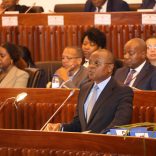Mozambique: Deflation of 0.07% in June
Mozambique: State companies a serious financial risk – World Bank

Image: World Bank
The World Bank warned on Tuesday that Mozambique’s state-owned enterprises (SOEs) represent the greatest potential risk to national public finances among African countries, accounting for almost 35% of GDP, second only to the vulnerability registered in The Gambia.
“In countries where state-owned enterprises (SOEs) represent a large share of economic activity, they can pose risks to public finances.(…) For 14 countries in Sub-Saharan Africa, SOE revenues average 7 percent of GDP, SOE assets average about 34 percent of public sector assets, and SOE liabilities average about 20 percent of GDP,” said the World Bank’s report on the operational context of public companies.
In the document, which analyses the situation of 76,000 public companies in 91 countries, the World Bank experts write that “when risks materialize, they often have major and lasting implications for fiscal deficits and debt as well as for the conduct of fiscal policy, and they can lead to economic and financial crises”.
The report, entitled ‘The Business of the State’, reviews the operational context of companies owned by countries or in which the state has a stake of more than 10%, giving it the role of an important player in the business landscape of public companies, which the report does not itemise individually.
“Debates over the role of the state in business are not new, but there is a growing interest among policy makers in leveraging state-owned enterprises (SOEs) to attain development goals, and the stakes are high,” reads the report.
“The state, as an owner of businesses, is both competing and collaborating with the private sector at the firm level, market level, and economywide,” it notes.
The report pointed to various examples of the positive use of the power of public companies as agents of the public interest, for example, by preventing the cutting off of essential services, such as electricity, to families who can no longer pay their bills, as happened in Angola and Nigeria.
On the other hand, it also points to cases in which the state takes advantage of its position, such as when the public company is a market supplier and at the same time contributes to regulatory policy, as in the cement sector in Angola, where the state limits the entry of new companies into the market and the public cement company is responsible for 30% of local production and influences the regulator’s decisions.
The fact that policies “keep private individuals out of economic activity or not has profound implications for investment and growth,” conclude the World Bank analysts.
The impact of the finances of state-owned companies on the state’s accounts is notorious in several countries, including Mozambique, not least because of the so-called ‘hidden debts scandal’, known in 2016, which threw the country into financial default, plunging it into an economic, international and financial crisis from which it is only now recovering.
The performance of Mozambique’s State Enterprise Sector (SEE), namely three companies, is identified as one of the main fiscal risks in 2024 in the Fiscal Risks Report, produced by the Ministry of Finance’s Risk Management Directorate and reported in September by Lusa.
Exposure to the SEE is one of the risks identified for 2024 by the Fiscal Risks Report, which emphasises, however, that this risk “improved considerably” in 2022, reflected in the reduction of the debt stock from 22% of GDP in 2021 to 4% of GDP.
The airline LAM, the fuel distributor Petromoc and the telecoms operator TMCEL “continue to deserve greater attention from the state, due to their fragile financial situation,” the RRF warns.
The Fiscal Risks Report is a document that presents the main sources of fiscal risks and mitigation measures “to reduce the exposure of public finances to unexpected events”.













Leave a Reply
Be the First to Comment!
You must be logged in to post a comment.
You must be logged in to post a comment.